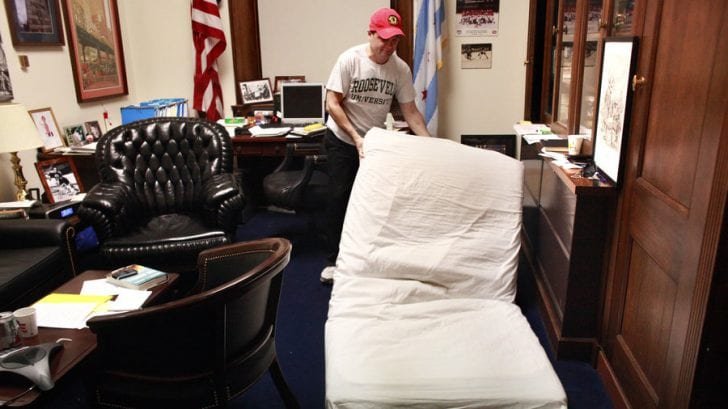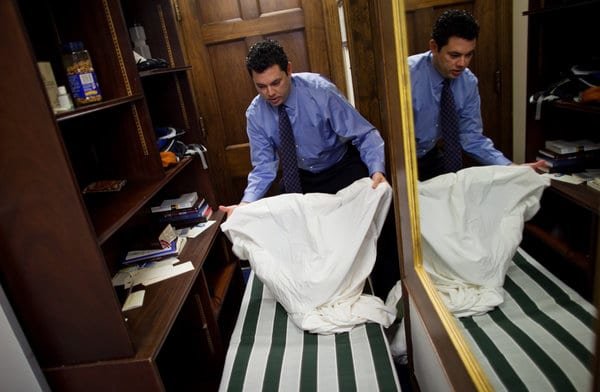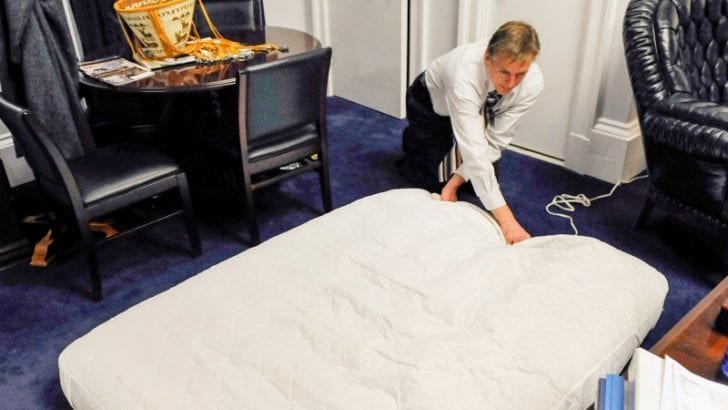
Congressmen Confess to Poverty Affliction

The latest from Washington has brought to light a revelation many didn’t see coming. Apparently, some congressional representatives have gone broke to the point where they have to sleep while on the job.

When quizzed about it, they resorted to defending their right to do so. According to them, decade-long stagnant salaries despite Washington’s steep cost of living have brought about the rising poverty rates
As a means to cope, the congressional representatives have now resorted to becoming professional squatters by night; they now spend their nights tucked in the Capitol Hill offices. They take to sleep in a number of different fittings, ranging from cots in their closets to futons that are stashed right behind constituent couches. All of this in a bid to save a couple of bucks during work weeks.
Representative Dan Donovan (R-SI) cited the fact that Washington is too expensive as the key motivator behind his decision to spend nights tucked inside his cot. The cot is located in a tiny alcove in his office. Donovan firmly believes that his actions are the only way he is able to serve Congress whilst paying up his New York City housing costs.
Despite the flack they have received as a result of their actions, Donovan is of the opinion that the only people who can afford rent or buying houses in Washington are the super millionaires. Given his dedication to his profession, he finds the current state of affairs to be in total contradiction to the aspirations of the Founding Fathers.
Opposition

However, not all other congressional representatives echo Donovan’s views on the matter. Some of his colleagues are in apparent disgust and would like the “undignified and unsanitary” practice to be banned
They have proposed new legislation to take effect as early as this month once their proposal goes through. The law would prohibit politicians from converting their places of work into makeshift sleeping quarters. The fellow congressional representatives have cited IRS and congressional ethics rules violations as the key motivators behind their move.
Representative Bennie Thomson (D-Miss) is of the opinion that the move by legislators to host others in the same offices that become their residences later on at night is unhealthy. She condemned the practice of sleeping in offices as an unethical practice that needs to be done away with.
Incredibly, she cited the provisions of free cable, electricity, janitorial, electricity and no rent as being one heck of a deal. As per estimations, one can comfortably save up to $25,000 to $30,000 per annum in unclaimed tax monies.
Differing Opinions

At present, it is estimated that about 100 congressional representatives have turned their offices into sleeping quarters
Despite the valid arguments raised as to why congressional representatives shouldn’t catch their zzz’s in office cots, the members involved actually believe that they also have a compelling reason to explain their malaise, they are short on money.
In their previous capacities, many of the congressional representatives got extra compensation/ per diem, as they served in their home state legislatures to cover some of their living expenses while stationed in the state’s capital.
In other states, the compensation is usually much higher. In New York State, the lawmakers in Albany receive $175 each day they are in town. In large cities like Sacramento, Calif, the daily stipend is much higher at $183 while in Austin, Texas, the rate is $190.
In their capacities as US representatives, they receive a salary of $174,000 annually, a figure that has not improved over the last decade. In essence, they receive no housing allowance despite the fact that they work in a city where sparse one-bedroom pads go from $2,000 per month. Importantly, most of the representatives are not natives of Washington, thus, they still have to pay additional dues in order to maintain a residence in their home states.
On the other hand, members in the House and Senate fare better. Part of the reason is that they rake in about $20,000 more annually than their congressional companions do. Their figures are $193,400 per year.
More inDriving
-
`
Why 1 in 4 Americans Trust RFK Jr. for Medical Advice
A recent poll reveals that a significant portion of Americans remain cautious about trusting Health Secretary Robert F. Kennedy Jr.’s medical...
September 19, 2025 -
`
Why Tariffs Could Make Car Insurance Rates Worse
Car insurance costs in the U.S. are climbing, and new tariffs could make the problem worse. Shoppers are already feeling the...
September 11, 2025 -
`
The Automotive Reckoning Has Arrived – Are Companies Ready?
In early 2022, Stellantis CEO Carlos Tavares stood on stage in Amsterdam with a confident blueprint for the future. Fresh off...
September 5, 2025 -
`
Self-Driving Cars Will “Drastically” Change Automotive Design, GM Says
The automotive industry is entering a new chapter that goes far beyond electrification. While EVs dominate today’s headlines, the rise of...
August 29, 2025 -
`
Child Wearing Swimsuit Outside Sparks CPS Visit — The Full Story!
Children playing outside is a familiar and often joyful sight. Yet, sometimes, an innocent choice—like a child wearing a swimsuit outdoors—can...
August 22, 2025 -
`
Florida Auto Insurance Rates Finally Drop. But for How Long?
After years of rising premiums, Florida drivers are finally seeing lower auto insurance rates on the horizon. For 2025, the state’s...
August 15, 2025 -
`
U.S. Reduces Tariffs on Japanese Cars to 15% Under Trump’s Deal
In a move reshaping U.S.-Japan trade relations, former President Donald Trump confirmed a new agreement that slashes tariffs on Japanese car...
August 9, 2025 -
`
Adults in Ohio Face Stricter Rules to Obtain Driver’s License
Ohio has passed a new law that will change the way adults under 21 get their driver’s licenses. Signed into law...
July 31, 2025 -
`
Gen Z Craves Career Guidance, But Their Parents Are Struggling Too
Gen Z is stepping into the future with curiosity and ambition—but they’re not doing it alone. A growing number of teens...
July 25, 2025















You must be logged in to post a comment Login